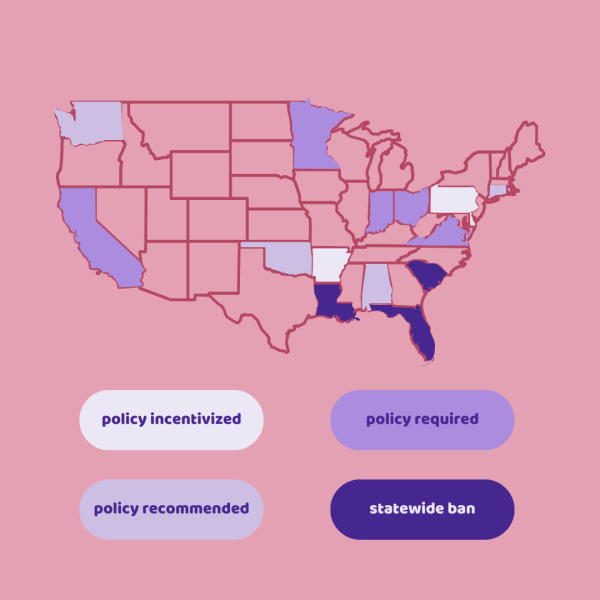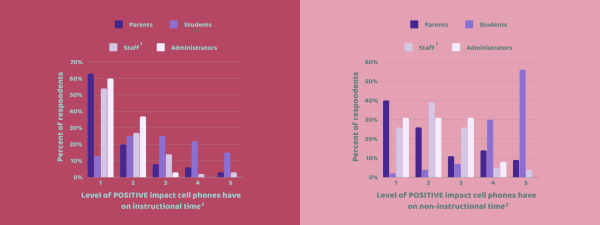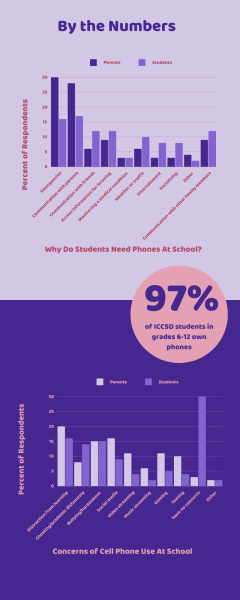
Mutamun Awadalla ‘27 takes out his phone during class, ignoring instructions from his teacher to keep it in his backpack. Then, he refuses instruction to put his phone in the phone pockets, and is sent to the SPACE by a hall monitor.
“The first time I went to the SPACE was really, really bad, because they made me stay there for five hours. I got in trouble because a teacher falsely accused me of talking in class, but I didn’t, then I got sent to the SPACE,” Awadalla said. “They treated me very horribly. They were very mean. They made me sit there for five hours and do nothing.”
This visit wasn’t for phone use, but Awadalla has been sent to the SPACE for using his phone. The only difference was that he had to stay for the rest of the class period, opposed to 5 hours. As shown by his phone use during class, Awadalla disagrees with the current phone policy.
This fall, the ICCSD school board and districts across the country have been considering and implementing new phone policies. As of mid October, the ICCSD school board has been strongly considering a total ban on phone use during school.
“I just feel like it’s not really necessary, because a lot of people need their phones for uses like emergency calls. A lot of people just need their phones,” Awadalla said. “It’s not okay to have everyone’s phone taken away.”
While Awadalla doesn’t think City High’s current phone policy is good, Lucas Iverson ‘27 feels differently.
“The current policy is on a good path to effectiveness. I think we could be a little stricter. I would just say that everybody puts the phone in the pocket as they walk in the door,” Iverson said. “Then there wouldn’t be any class time wasted on teachers saying, ‘Hey, put in the pocket, and then students resisting, and then now… we’ve been derailed for 45 seconds, which is not a lot of time, but if that happens with six people, now minutes of class have been wasted.”
Though Iverson does not appreciate it when class time is wasted because of phone use, he does not think a full ban will be effective.
“I just don’t think it will work, because I think the people who are having phone problems now will continue to weasel around the rules,” Lucas Iverson said. “I don’t think it’ll be effective and I think it will be a lot of headaches and work for teachers.
Iverson is not alone in feeling that a complete phone ban would be unhelpful.
“I feel like banning phones is too much. A phone is something very personal,” Miamen Elawad ‘25 said. “Students have lives outside of school and if they ever need to communicate with friends or family outside of school, that should be an option.”
Stevie Aguirre ‘26 agreed that they feel there should not be a complete ban so students can communicate with parents and friends, especially to get rides home. However, they do think students currently have their phone out too often during class.
“I think really it’s just a matter of teachers actually enforcing the policy more. I feel like a lot of teachers are like, ‘We’ll do it. I’m gonna be stricter on this.’ And then they never are,” Aguirre said. “Personally, I’m not on my phone a whole lot during the school day, but what’s really distracting to me is people scrolling on Tiktok or texting someone and I can see their phone screen.”
From an administrative standpoint, some teachers and administrators have become increasingly frustrated with the constant use of smartphones in school. Ruthina Malone, the president of the ICCSD school board, cited the loss of instructional time as a major reason to be worried about cell phones in school.
“We have heard from parents, staff, administrators and some students that the use of devices during instructional time has been distracting and has led to issues related to learning for students,” she said.
Besides instructional disruptions, advocates for phone policies say that phones have adverse effects on students’ mental health. People, especially teenagers and young adults, who spend more time on their phone report higher levels of anxiety and depression.

Malone also expressed concern that phones were escalating fights and other unwanted activities. Fights and disagreements that started outside of the school day were being coordinated and organized online during school hours. Bystanders were filming fights and posting them on social media.
Constant access to social media is also a concern. In the three weeks directly following the Apalachee High School shooting in Georgia, over 700 students were arrested on charges related to violent threats made against schools in the surrounding area. For the most part, they were spread through the use of social media.
Florida, South Carolina, and Louisiana all have statewide restrictions banning students from using phones during school hours, with details varying between states. Five other states– California, Indiana, Minnesota, Ohio, and Virginia–all require school districts to have phone policies in place. Many others–although not Iowa–recommend or encourage policies.

Since August, the ICCSD school board has been working on a phone policy that will encompass all middle and high schools in the district. The final policy is set to be decided at the second school board meeting in October.
Right now, the Iowa City Community School District’s phone policy is based on how administrators and staff feel they can enforce cell phone rules from building to building. However, things can differ from room to room as well, and standards are largely decentralized.
“One issue I remember is that there would be one teacher that was a stickler of ‘no cell phones out,’ and then they’d have a teacher where the cell phones were out the entire class,” said Mitch Lingo, an ICCSD school board member and former teacher. “That lack of consistency throughout the school day created a lot of problems for all the teaching staff in my building.”
These conflicting views can create different expectations from students about cell phone policies in their different classes. This has prompted the discussion around a potential new policy for the district.
A new book published this past March, The Anxious Generation, by social psychologist Jonathan Haidt, examines the rising levels of depression and anxiety in young people and attributes some of that to the rise of smartphones and social media use. The school board has focused efforts around reading and discussing this book and how it might affect a phone policy.
“I can see social media negatively affecting all kids, regardless of who they are, because there’s a lot of different messages that students are exposed to on social media,” ICCSD School Board President Ruthina Malone said. “I have to limit what I see and watch because there’s a lot of negative information that comes from that if you’re just consumed by it daily. The book [The Anxious Generation] talks about the overwhelming amount of time that young people are on their devices as opposed to connecting with each other face to face.”
Many different schools around the country have also been implementing new phone policies this school year. Most have based their decisions on the same rationale.
“Since we don’t have concrete policies yet, I can tell you what some directors have vocalized that they would like to see,” Malone said. “Some are on the side of a total ban where you can have [your phone] on your person, but it has to stay out of sight in your backpack or wherever you secure it. It would have to stay there from First Bell to Last Bell. Some believe that [they can] try it where [students] can have it out at passing or at lunch.”
Right now, any new policy that could be created is in the development stage, with the board discussing things at its future meetings. They have also sent out a survey to all District students and parents regarding their feelings about cell phone usage in school and its potential impacts.
“We asked it [phone policy discussions] to go to the secondary principals (of ICCSD middle schools and high schools) to discuss what they believe is the most feasible option that we could apply across all secondary schools,” Lingo said.
As of mid October, the school board has asked Superintendent Matt Degner to provide input on a complete ban of cell phone use during school.
“We are considering a complete ban in order to remove the distraction on learning that cell phone use is causing students,” board member Charlie Eastham said.
This policy would likely go into effect after winter break, near the start of January.
“The timeline that we initially talked about was the end of October, so we can put it in place as soon as folks come back from winter break. We’ve heard some directors vocalize that if we have a policy we feel good about, we should roll it out. We shouldn’t wait,” Malone said.
The district has some plans for when and what a policy change for cell phones could look like, but the specifics of the policy are still unclear. However, the board members are in agreement that there needs to be a change soon.
Ali Borger-Germann’s classroom is silent as she waits for the bell to ring for First period. It used to be almost always full of chatter, but now all she sees is students looking at their phones.
“If I come into my room and students have arrived early, they’re not talking to each other,” Borger-Germann said. “They’re literally all on their phones, completely silent. There’s none of the chit chat that is an essential component of school.”
Borger-Germann teaches English and the AP Capstone Diploma course. She has been at City High for 22 years, so she has seen how phones have had an impact on students’ learning.
“They are distracting academically, and they prevent students from socializing with each other in real time, in face to face ways,” Borger-Germann said.
Borger-Germann isn’t the only teacher who feels this way. According to Pew Research, 72% of high school teachers agree that students being distracted by cell phones is a major problem.
Some teachers believe that the best way to decrease distractions in the classroom caused by phones would be to ban them.
“I would be absolutely 100% behind [a phone ban], but I do think that it would be hard to enforce in the halls,” social studies teacher Nathan Hellwig said. “We had a complete ban on–this is going to date me a little bit–[iPods and mp3] things. We would tell kids in the hall to take their headphones off and stuff like that, and kids would be in the bathroom with them. I’m not going to tell a kid who’s in a stall, ‘Hey, take that off.’”
Nathan Hellwig has been teaching at Southeast Middle School and City High since 2000. The ban on iPods and mp3s took place in 2005-2006. Though Hellwig says a complete ban would be hard to enforce because of his experiences with the ban in 2005, Borger-Germann states the current policy also has problems in application.
“It requires me to be monitoring the room all of the time.” Borger-Germann said. “It doesn’t actually put the phones away. It just means they’re hiding them behind books. They’re hiding them under the table. They’re hiding them in the desks. They’re putting them in their crotches. I mean, I can’t tell you the number of places that I’ve seen phones, embarrassing places, honestly, embarrassing to them, but they have no compunctions.”
Borger-Germann is not alone in finding City High’s phone policy hard to implement. As of Spring 2024, 60% of high school teachers found phone policies hard to enforce. Borger-Germann also has ideas for a prospective phone ban that would be easier to apply in the classroom. One plan she proposes is having everyone use the phone pockets all class period, instead of having them used only when a teacher sees you using your phone, but she doesn’t think that that would help with students’ limited attention spans or declining social interaction.
“One method school districts have implemented [where] you check your phone in when you check into the building and you check your phone out when you check out of the building have been a lot more successful.” Borger-Germann said, “[It]
usually takes a couple weeks for students to adjust, but they do, and that seems to help a lot more with the fracturing of attention and the social components.”
At Herbert Henry Dow High School in Midland, Michigan, junior Angelina Chen is no longer allowed to have her phone at school. Starting this year, Dow High School has banned students from using phones in class, during passing time, and at school events required for classes.
“Phones were beneficial in some ways. They were helpful for communicating with parents about after school activities, and I used to use Google Calendar religiously [which I can’t use anymore], but they were also distracting in class,” she said. “It’s inevitable that you get a notification that you want to check and cheating with phones was also an issue.”

At first, feedback about the new policy was very negative. But as students got used to not being able to use their phones during class, they learned to adapt and use the extra time they would have previously spent on their phones to get more done.
“Before the policy, I’d always reach for my phone during extra work time in class,” Chen said. “Now, I just get random small things done and I’m able to get more work done in class.”
Dow High School is not alone. Different districts across the country have also been starting new phone policies this year or are planning to after winter break.
“The new rule at OPRF is that you have to put your phone in a pocket when you walk into a classroom, and you aren’t allowed to be on it during the class,” said Juan Rosado ‘25, a former City student who now attends Oak Park and River Forest High School in Oak Park, Illinois. “I don’t really feel like I’m losing anything useful that I would be doing on my phone during class time,” Rosado said.
Oak Park and River Forest High School has implemented a new phone policy this year where students are required to put cell phones in little pockets called ‘phone homes’. ICCSD has also been looking at districts such as OPRF for effectiveness and applicability of potential policies.
“We gathered information from districts similar to Iowa City and within close proximity. Some of them are total bans, where you cannot use them at all on campus. Others, they allow at lunch and passing. Some allow for teacher discretion,” said Malone.
However, not all schools have a uniform policy. NSU University School in Davie, Florida–near Miami–has a new policy starting last month that bans cell phones in bathrooms, but individual classroom policies vary by teacher.
“Especially in high school, you need to really focus on being successful in the future,” NSU student Sofia Lindley ‘26 said. “Because of that, I think they’re fine as long as you are doing okay. However, it’s obviously important to be respectful. You can’t just have a teacher lecturing and you’re on TikTok or something.”
Lindley hasn’t noticed a huge change since the implementation of the new rule. Not as many people are meeting up in the bathrooms during class, but it wasn’t a huge issue before at NSU.
The looming prospect of a district-wide phone ban seems scary. But for students who have had to adjust to a new phone policy this year, they have realized that it’s not all that bad.
“It‘s really not the end of the world and there are bigger things to worry about,” Chen said.
In the Iowa City Community School district, the final details of the new phone policy remain uncertain. But one thing’s for sure–the ICCSD school board and schools across the country believe that a phone policies are not just beneficial for student learning and mental health, but crucial.
“There’s still this sense of cruel optimism that to expect students to being able to have the power, the ability to [put their phones away and focus during class] by themselves at all times, and it’s not reasonable,” Mitch Lingo said.





















